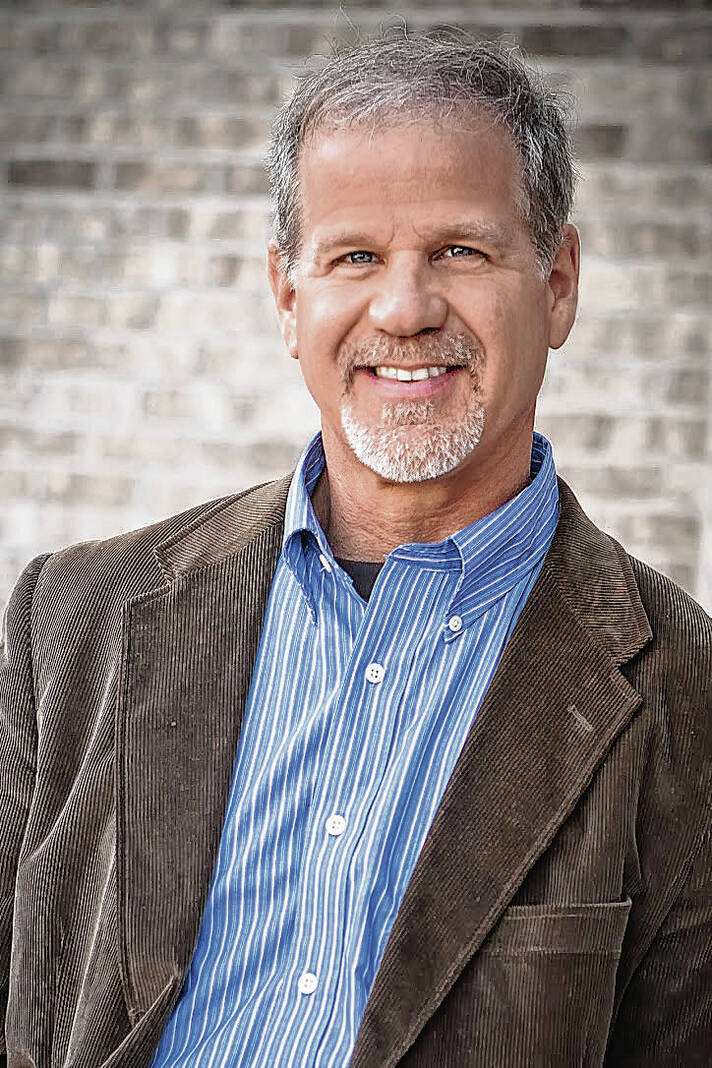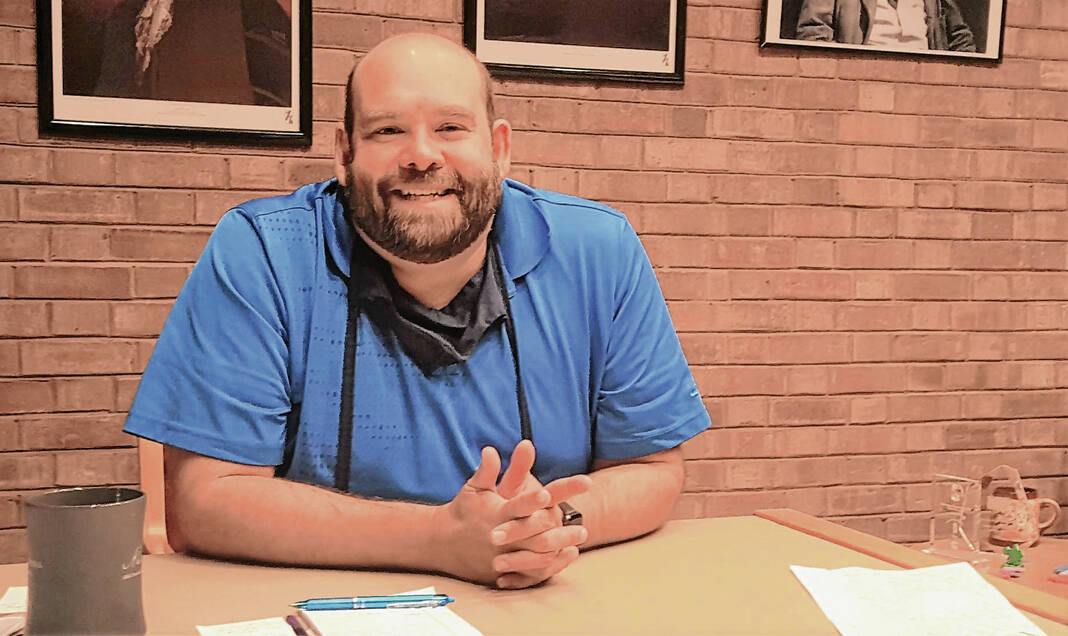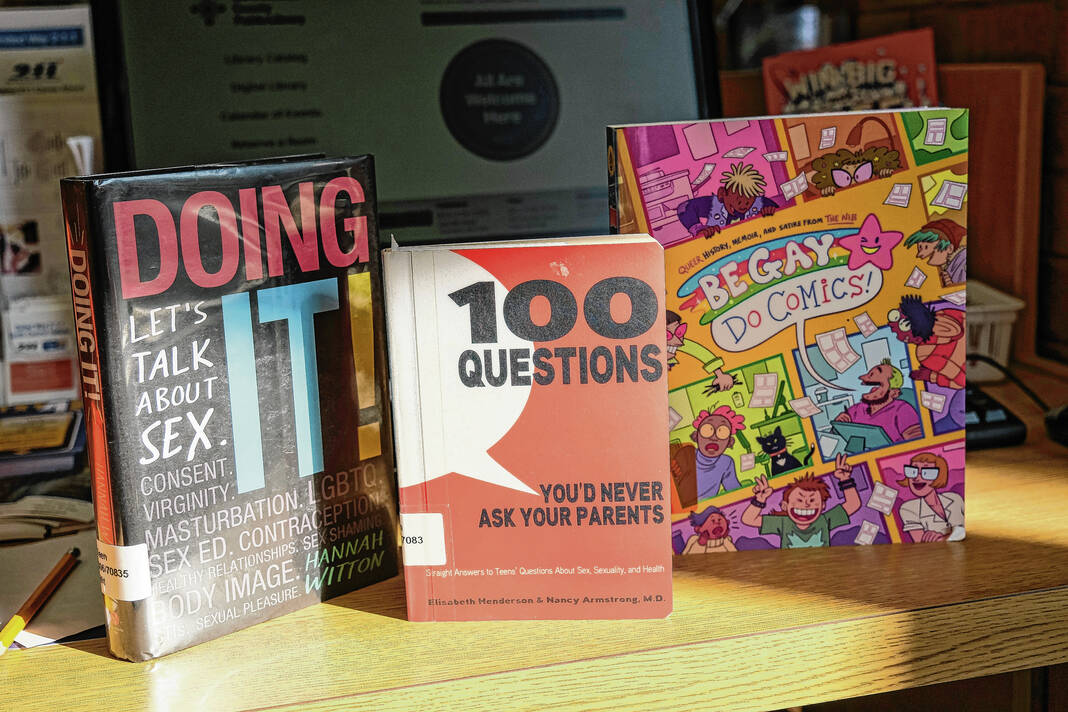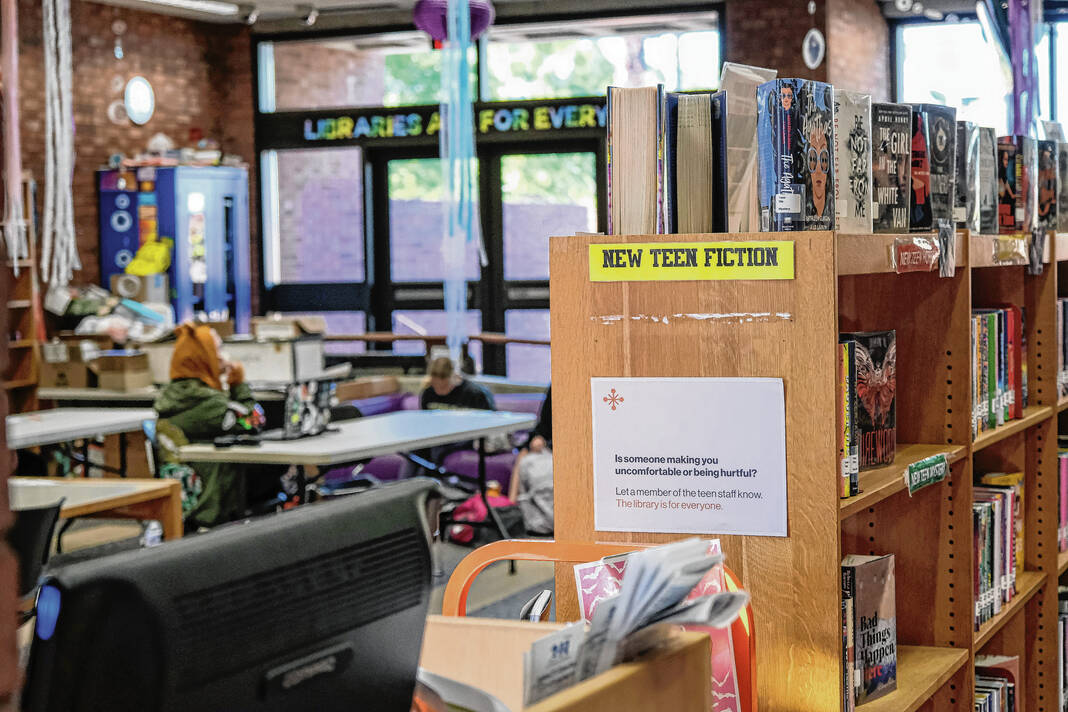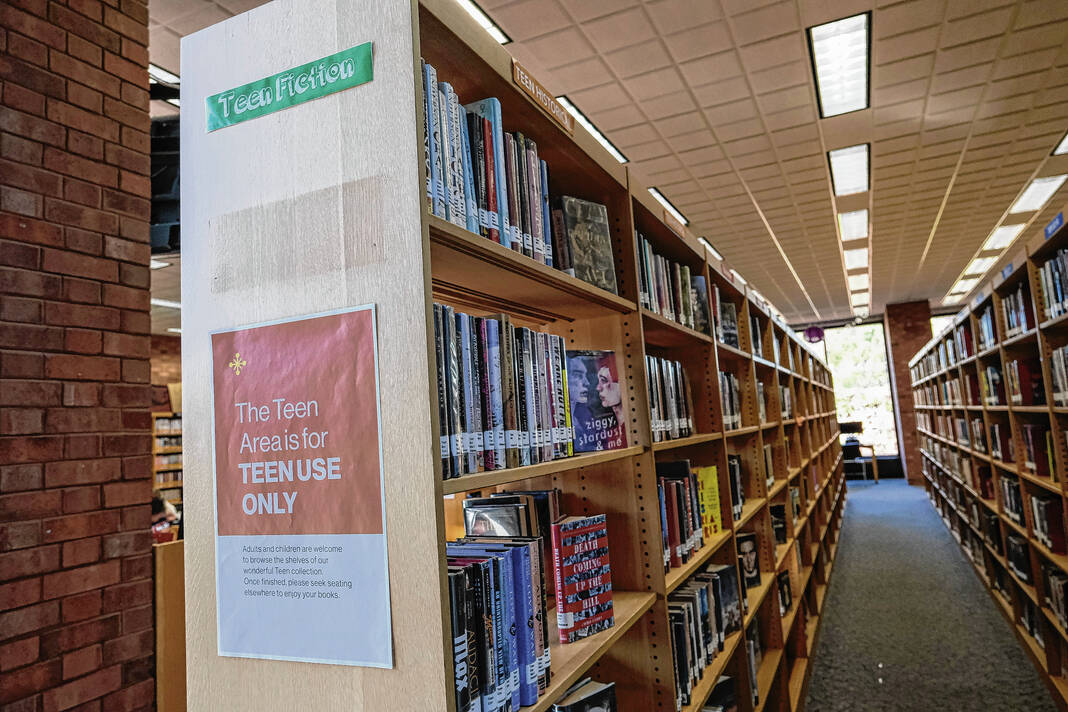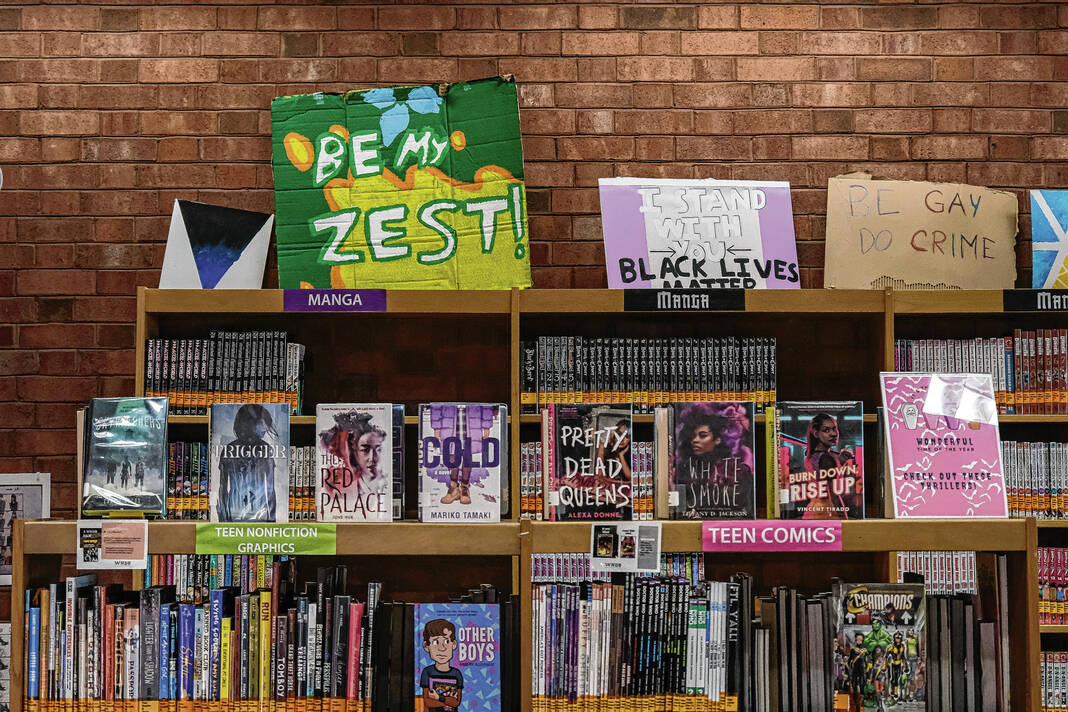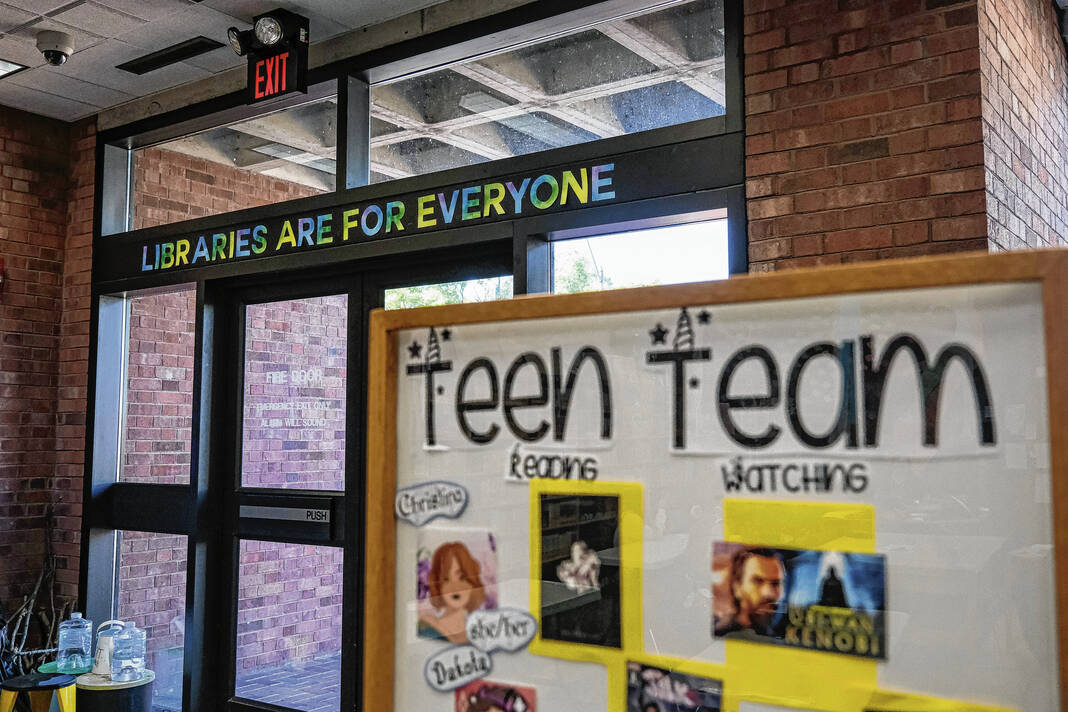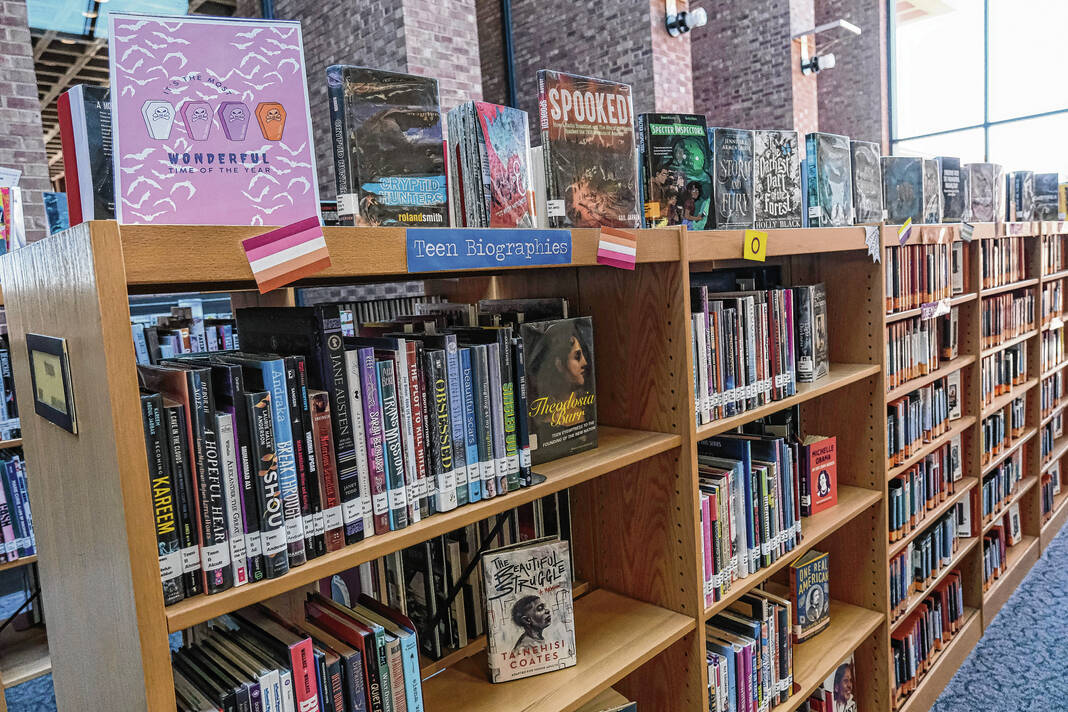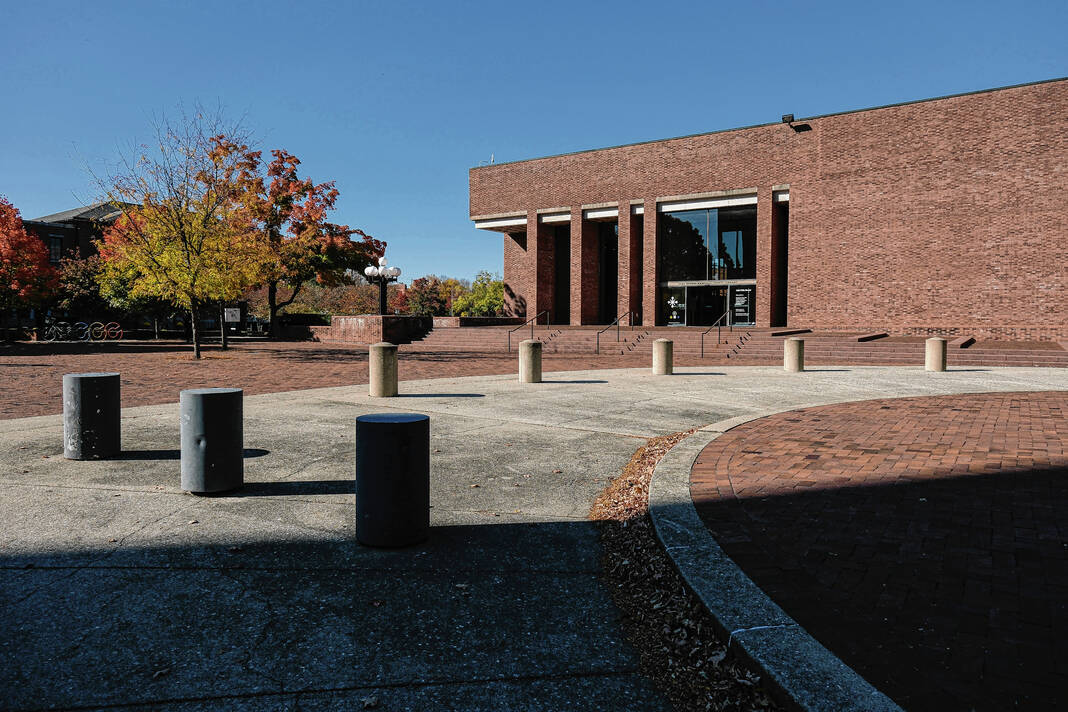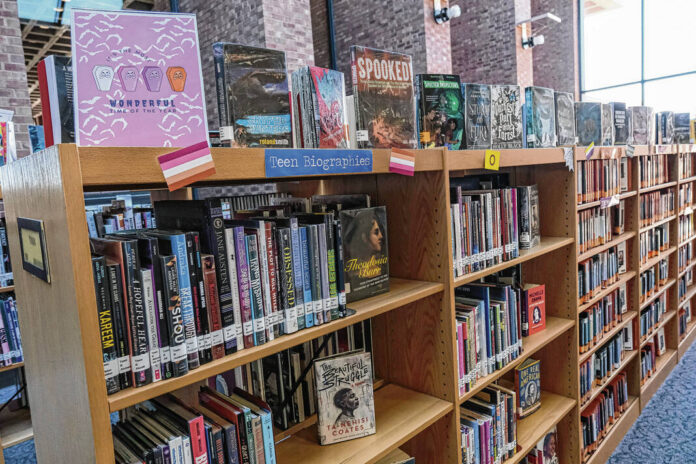
Mike Wolanin | The Republic A view of bookshelves in the teen section of the Bartholomew County Public Library in Columbus, Ind., Friday, Oct. 21, 2022.
Bartholomew County has been catapulted into the middle of a growing wave of efforts sweeping the country that seek to ban or restrict access to books dealing with gender, sexuality and sex education.
During roughly the past three weeks, the Bartholomew County Public Library has received 13 requests to remove six books from its teen section — or from the library catalog altogether — according to copies of the requests obtained by The Republic.
On Oct. 5, library official received requests to remove five books from its teen section, objecting to what the individuals described as “sexually explicit information aimed at children,” the requests state. The books included “This Book is Gay” by Juno Dawson, the anthology “Be Gay, Do Comics,” “100 Questions You’d Never Ask Your Parents” by Elisabeth Henderson and Dr. Nancy Armstrong, “Ready for It” by Chusita Fashion Fever and “Doing It” by Hannah Witton.
It was the first time in at least 16 years that the library had received such a request, let alone five at the same time, said Bartholomew County Public Library Director Jason Hatton. But within the next two weeks, eight more requests arrived — each one complaining about Maia Kobabe’s bestselling memoir “Gender Queer” about sexual identity.
Six of the requests asked library staff to remove the memoir from the library’s catalog altogether, or as one request put it: “Delete it from your shelves.” The other two requests asked for the book to be removed from the teen or young adult section even though it has always been shelved in the adult graphic nonfiction section.
The requests claim that “Gender Queer” is “pornography,” “brainwashing our children,” will “make kids confused about who they are” and that children don’t have the mental capacity to “understand” LBGTQ content, as the “frontal loab (sic) does not develop until twenties.” “Freedom of speech is for adults. Protect Children,” another request to remove the memoir states.
“Gender Queer” is a graphic novel about coming out as nonbinary, referring to gender identities that are not entirely male or female. The book contains a handful of illustrations of sexual experiences and menstrual blood among its hundreds of drawings.
The library has rejected the requests to remove “Gender Queer” from its catalog, stating, “This book is not written to be pornographic. The memoir is a nuanced examination of nonbinary gender identity in a way that benefits those who identify as nonbinary and those who wish to better understand the nonbinary gender. …It was selected with the idea it would be useful to those who are struggling with their own identities, and to those wishing to understand what their friends and loved ones are going through on their respective journeys of finding their identities.”
Decisions on the other books were still pending on Friday.
Hatton said the book challenges have been “hurtful” and “frustrating” for him and his staff.
“This is definitely a new phenomenon,” Hatton said. “…I find very frustrating that there isn’t that trust in us as a library and us as librarians that we’re going to be doing the right thing for the community because we are. We care about our community. We love our community.”
“The staff find it very hurtful,” Hatton added. “There’s just, I would say, low morale, so to speak. It’s hits home. It’s very hard to hear that people are saying the work you’re doing is harmful. We all got into this job to help people, to uplift them, to care for them, and when you’re accused of harming them or doing damage to them, it hurts.”
National trend
The push to remove books from the Bartholomew County Public Library comes as a wave of attempted book banning and restrictions continues surges across the country, reaching levels not seen in decades, according to the American Library Association.
Last month, the ALA said it had documented 681 attempts to ban or restrict 1,651 titles in library catalogs during the first eight months of this year. By comparison, there were 729 attempts to censor books in libraries, targeting 1,597 titles in 2021.
These efforts, however, have not been not limited to materials at public libraries. PEN America tracked 2,532 decisions to ban books at schools from July 1, 2021, to this past June 30, including 17 decisions to ban books at three school corporations in Indiana.
The ALA has attributed the surge in challenges to books to a “coordinated, national effort” led by conservative groups seeking to “ban and challenge materials that address racism, gender, politics and sexual identity.”
“The unprecedented number of challenges we’re seeing already this year reflects coordinated, national efforts to silence marginalized or historically underrepresented voices and deprive all of us — young people, in particular — of the chance to explore a world beyond the confines of personal experience,” said ALA President Lessa Kananiʻopua Pelayo-Lozada in a statement. “…Efforts to censor entire categories of books reflecting certain voices and views shows that the moral panic isn’t about kids: it’s about politics. Organizations with a political agenda are spreading lists of books they don’t like.”
As efforts to ban or restrict access to books continue to accelerate through social media and conservative political campaigns, rifts have broken out at school and library board meetings across the country, including in Bartholomew County.
Last week, hundreds of people turned out for public comment at a Bartholomew County Library Board meeting, becoming heated at times, with people in the audience talking back to those they opposed or clapping in agreement.
Waves of efforts to ban books have taken place periodically throughout much of U.S. history, with people often using protecting children as a “smokescreen for other larger issues,” said Raymond Haberski, professor of history and director of American studies at IUPUI, who is part of the Center for the Study of Religion and American Studies.
Currently, the LGBTQ community currently is “in the crosshairs of a particular segment of the Republican right, the far right,” he said.
“I think what is happening is that these books are kind of a stand-in for opposition to entire groups of Americans and how they live their lives,” Haberski said. “Banning these books or having them removed from libraries is simply another way to say that these groups oppose the way people are, their identities. Instead of coming out and being bigoted to people’s faces, they’re going after the books in libraries and saying that those books exist or if my children come across them, somehow, they’re going to be hurt by them, which basically means that they’re saying that children would be hurt by simply living in the same community with people who are not necessarily like them. To me, that is incredibly disturbing.”
Local crusade
Locally, the fight against the books at the Bartholomew County Public Library is being led by a group of people from Blessed Life Fellowship, a church in Columbus, whose members have been attending library board meetings since April to complain about LGBTQ content and sex education material they find objectionable.
The group’s pastor, Andy Robbins, who lives in Shelby County, said earlier this week that the group is not seeking to ban books, but “simply to relocate them to an age-appropriate section.”
However, in emails to the library’s director, a member of the church has suggested the group’s goal extends beyond relocating a few books. Instead, the group is wanting to do away with the entire teen section and reshelve the books in other areas of the library, telling Hatton via email that “if you get rid of the teen section, you won’t hear from us again.”
“That isn’t acceptable to us at all,” Hatton said. “We want to have a collection that is for our teen community because they’re different. They’re different than fourth graders. They’re different than 50-year-olds. We want to make sure that have programming, that we have collections, that we have services specifically oriented to teens, to children, to adults, to young adults.”
Robbins said on Friday in an email to the Republic that he had a “good and productive conversation and came to terms with a few things. There will probably be some changes coming,” he said, referring to a conversation with Hatton. “Maybe not exactly like we envision but they will be in an evaluation process in the coming weeks and be considering our suggestions seriously and looking at things from that angle.”
Hatton described it as a “good conversation.”
“My understanding of the discussion is that (Robbins) will be looking forward to the investigative work we are doing to examine our teen materials,” Hatton said. “I think I helped him believe that this truly is a good faith effort on our part to hear their concerns and react appropriately.”
It is unclear why a Shelby County resident is concerned about books at a library in another county. Robbins could only check out books in the Bartholomew County Library through a statewide loan program.
The Shelby County Public Library, for its part, also has a physical copy of “Gender Queer” and “This Book is Gay” in its catalog, as well as electronic editions of “100 Questions You’d Never Ask Your Parents,” “Doing It” and “Ready for It.”
Robbins declined to respond to questions for this story, instead pointing to comments his wife Donna made a library board meeting earlier this week: “Why place these kinds of materials front and center and display them, as if to say, ‘Hey, kids, come over and look here?’ And that’s kind of what it feels like. It feels like it’s an in-your-face, ‘Here, here children. Let’s enter the world of sexual promiscuity. Let’s enter this world.’ And they’re too young for that.”
In a testimony on the public website of his Blessed Life Fellowship ministry, Robbins describes himself as a former womanizer who was once “addicted” to “shallow sexual encounters.” In a 1992 column in The Republic, Robbins wrote, “I got involved with a male dance revue, prostituting my body for the thrill of the admiration of dozens of drunken females.”
According to the church website, Robbins said he was raised in a very troubled and broken home. From that experience, he is “able to relate very well to those who have struggled with habitual sin, addiction and extreme brokenness in their lives,” the website states. “One of Pastor Andy’s passions is to help guide people through the landmines of life with the wisdom he has acquired from his experiences on both sides of grace,” according to the church website.
The website says that Robbins has been a successful businessman while active in ministry for more than 20 years.
LGBTQ discrimination
The LGBTQ community often has been subjected to harassment, bullying and threats in Bartholomew County.
Columbus police reported three hate crime incidents in 2019 and 2020 that the Federal Bureau of Investigation classified as anti-lesbian, gay, bisexual or transgender, federal records shows.
In recent years, people also have destroyed or removed items from the Bartholomew County Public Library’s displays during Pride month, Hatton said.
In 2015, the decision by the city of Columbus to added the LBGTQ community as a protective class in discrimination cases exposed a divide in Columbus, particularly in the religious community.
Just over two decades before that, former Columbus Human Rights Commissioner Bobby Woodall resigned, saying he was pressured to step down because of his view that homesexuality is sinful, telling The Republic at the time that “I have to follow God’s law, not man’s law.”
Currently, it is unclear how the latest push to ban or restrict access to books will play out.
“People are being called out as wrong morally by people who don’t have the power to make those claims for all of us, and that is always the problem with banning something,” Haberski said. “When you take it out of circulation, you are doing this not in the name of the public, but in the name of your group. And by doing that, not only does it eliminate something that many of us would like to look at and read, but also targets an entire group of Americans who we live with.”
“People’s identities will not change,” Haberski added later in the interview. “Being gay will not disappear. Writing about gay lifestyles will not go away. So, I don’t know what the endgame is for some of these groups who are opposing these books, because, unless they outlaw thought, it’s not going away.”
Books being challenged in Bartholomew County
1. “Gender Queer: A Memoir” by Maia Kobabe
2. “This Book is Gay” by Juno Dawson
3. “Be Gay, Do Comics,” an anthology by The Nib
4. “100 Questions You’d Never Ask Your Parents” by Elisabeth Henderson and Dr. Nancy Armstrong
5. “Ready For It” by Chusita Fashion Fever
6. “Doing It” by Hannah Witton
Source: Bartholomew County Public Library
Top 10 most challenged books in the United States in 2021
1. “Gender Queer: A Memoir” by Maia Kobabe
2. “Lawn Boy” by Jonathan Evison
3. “All Boys Aren’t Blue” by George M. Johnson
4. “Out of Darkness” by Ashley Hope Perez
5. “The Hate U Give” by Angie Thomas
6. “The Absolutely True Diary of a Part-Time Indian” by Sherman Alexie
7. “Me and Earl and the Dying Girl” by Jesse Andrews
8. “The Bluest Eye” by Toni Morrison
9. “This Book is Gay” by Juno Dawson
10. “Beyond Magenta” by Susan Kuklin
Source: The American Library Association Office for Intellectual Freedom

